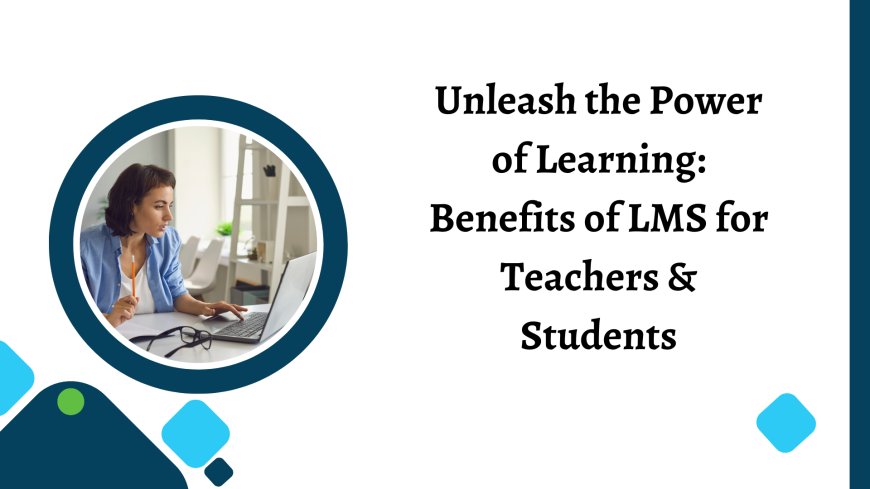Unlocking Learning Insights with Learning Management System
Educators, unlock the power of data! Learn how Learning Management System (LMS) go beyond content delivery, providing valuable insights into student activity, engagement, and performance.

In the world of education, the quest to improve student learning is constant. Traditionally, educators have relied on tests and assignments to gauge understanding. But what if there was a way to gain a deeper, more nuanced picture of how students are learning? This is where Learning Management System (LMS) emerge as powerful tools, empowering educators to make data-driven decisions that enhance learning outcomes.
Unveiling the Power of LMS: Beyond Content Delivery
Imagine a platform that goes beyond simply delivering course content. An LMS acts as a central hub, storing a wealth of data on student activity, engagement, and performance. This data goes far beyond traditional test scores, revealing valuable insights into how students interact with the material, identify areas of difficulty, and track their progress over time.
Demystifying the Data: A Look at What LMS Tracks
Here's a glimpse into the treasure trove of information gleaned from an LMS:
- Activity Tracking: LMS tracks student activity within the platform. This includes factors like time spent on specific modules, frequency of accessing materials, and completion rates for assignments. These insights can reveal areas where students might be struggling and require additional support.
- Assessment Data: Quizzes, exams, and other assessments provide valuable data points. However, LMS goes beyond just scores. It can analyze student responses, identify missed questions, and even track answer patterns, offering educators a more comprehensive picture of student understanding.
- Engagement Metrics: Engagement is crucial for effective learning. LMS tracks various engagement metrics like participation in discussions, forum activity, and completion rates for interactive exercises. Low engagement can indicate a need to revamp teaching methods or explore alternative learning strategies.
From Data to Insights: Transforming Information into Action
The raw data collected by LMS is valuable, but its true power lies in its ability to be transformed into actionable insights. Here's how educators leverage this data:
- Personalized Learning: LMS data allows educators to tailor their instruction to individual student needs. This might involve providing additional support for students struggling with specific concepts, offering advanced challenges for high-performing students, or creating personalized learning paths based on their strengths and weaknesses.
- Formative Assessment: Traditional assessments often occur at the end of a learning unit. LMS data allows for continuous, formative assessment. Educators can monitor student progress in real-time, intervene early when difficulties arise, and adjust teaching methods accordingly.
- Improved Course Design: By analyzing student performance data across different learning modules, educators can identify areas where the course content might not be clear or engaging. This data can inform course revisions, ensuring the learning experience is optimized for future students.
Building a Collaborative Learning Environment: The Power of Communication
Data-driven insights aren't just for educators. By leveraging LMS features, educators can foster a communication-rich learning environment:
- Individualized Feedback: LMS data empowers educators to provide targeted feedback to students. They can pinpoint specific areas where improvement is needed, offer suggestions for additional resources, and track student progress based on the feedback provided.
- Peer-to-Peer Communication: Many LMS platforms integrate discussion forums and collaboration tools. This allows students to interact with each other, share insights, and clarify confusing concepts. This collaborative learning environment can foster deeper understanding and a sense of community within the learning process.
- Transparent Communication: LMS can be used to share learning materials, updates, and announcements with students in a centralized location. This ensures transparency and keeps everyone on the same page, fostering a collaborative and supportive learning environment.
The Future of Learning Analytics: Beyond the Basics
The field of learning analytics is constantly evolving. Here are some exciting trends to watch:
- Artificial Intelligence (AI): AI-powered features can analyze vast amounts of data to identify patterns and personalize learning experiences even further.
- Predictive Analytics: Advanced analytics can predict potential student difficulties and allow educators to intervene proactively.
- Big Data Integration: Combining LMS data with other student data sources like attendance records can provide a more holistic view of student performance.
Conclusion: Embracing Data for a Brighter Learning Future
Learning Management Systems are more than just content delivery platforms. They are powerful tools that empower educators to gather valuable data, transform it into actionable insights, and ultimately enhance the learning experience for all students. As data analytics continues to evolve, the future of education promises to be personalized, data-driven, and focused on fostering a lifelong love of learning.
What's Your Reaction?























